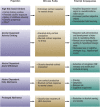Stress and the HPA axis: role of glucocorticoids in alcohol dependence
- PMID: 23584113
- PMCID: PMC3860380
Stress and the HPA axis: role of glucocorticoids in alcohol dependence
Abstract
Stress has long been suggested to be an important correlate of uncontrolled drinking and relapse. An important hormonal response system to stress-the hypothalamic-pituitary-adrenal (HPA) axis-may be involved in this process, particularly stress hormones known as glucocorticoids and primarily cortisol. The actions of this hormone system normally are tightly regulated to ensure that the body can respond quickly to stressful events and return to a normal state just as rapidly. The main determinants of HPA axis activity are genetic background, early-life environment, and current life stress. Alterations in HPA axis regulation are associated with problematic alcohol use and dependence; however, the nature of this dysregulation appears to vary with respect to stage of alcohol dependence. Much of this research has focused specifically on the role of cortisol in the risk for, development of, and relapse to chronic alcohol use. These studies found that cortisol can interact with the brain's reward system, which may contribute to alcohol's reinforcing effects. Cortisol also can influence a person's cognitive processes, promoting habit-based learning, which may contribute to habit formation and risk of relapse. Finally, cortisol levels during abstinence may be useful clinical indicators of relapse vulnerability in alcohol-dependent people.
Figures


References
-
- Aardal-Eriksson E, Eriksson TE, Thorell LH. Salivary cortisol, posttraumatic stress symptoms, and general health in the acute phase and during 9-month follow-up. Biological Psychiatry. 2001;50(12):986–993. - PubMed
-
- Adinoff B, Krebaum SR, Chandler PA, et al. Dissection of hypothalamic-pituitary-adrenal axis pathology in 1-month-abstinent alcohol-dependent men, part 2: Response to ovine corticotropin-releasing factor and naloxone. Alcoholism: Clinical and Experimental Research. 2005b;29(4):528–537. - PMC - PubMed
Publication types
MeSH terms
Substances
Grants and funding
LinkOut - more resources
Full Text Sources
Other Literature Sources
Medical

